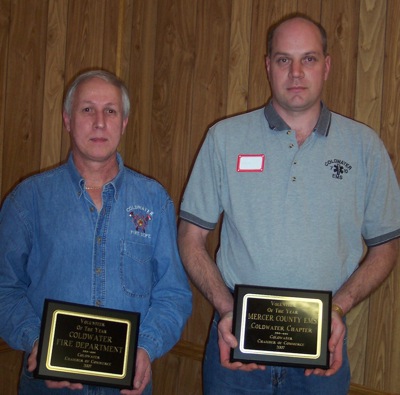Thursday, February 21st, 2008
Deer and badgers and bears - oh my!
By Janie Southard
ST. MARYS - Last season's deer records in Auglaize County and the return of the black bear to Ohio were among the wildlife information Rotary Club members learned at their Wednesday meeting.
Matt Hoene, state wildlife officer for Grand Lake, told Rotarians the 2007 record of 912 deer harvested in the county topped the 2006 record by 235 animals. He cited the antler-less deer tags as one reason for the increase.
"The only way we have to control our deer population is by hunting - or by automobile on the highway, if you look at it that way," Hoene quipped.
Statewide the season's harvest was 237,000 deer up 7,000 from the 2006 season. One reason for that increase was the high number of deer who died from a disease from a black midge bite called blue tongue.
"Actually the number was not as high as it could have been because opening day of muzzle season was rainy and miserable so not many hunters were out," he said, adding not all animals are taken in season.
Ohio has its share of poachers but the state's new restitution legislation will take effect on March 1, and it contains a huge increase in fines.
The deer taken illegally today would cost the poacher $400 in fines. That same deer taken after March 1 will cost $18,000 in fines. Fishing fines will increase too. The $10 fine for an undersized fish now will increase to $25 after March 1.
And, then there was Hoene's badger story.
Hoene and another wildlife officer, Ryan Garrison, were called out to a badger hunt in the Celina Wal-Mart parking lot.
"We chased him all over and into the cart storage area. He was fast and, believe me, he was mean. We felt like two little girls jumping around in the carts," he said, adding badgers must have a thing for Wal-Mart because six months earlier there was one in the Greenville Wal-Mart parking lot. Maybe it's that smiley face thing that attracts them, one Rotarian joked.
There aren't a lot of badgers around, but wild hogs are frequently seen in the local area, he added.
"These are pretty much (domestic) hogs that escape their pens. Hogs are the quickest animal to revert to the wild. In no time these animals develop tusks and longer hair," he said. "And, they can get mean."
Another species that gets mean and is almost always a nuisance to homeowners around the lake are Canada geese.
"About the only thing that's effective with them are harassment techniques - rattling pans, making noise, chasing them, even that Mylar tape helps ... And, this is the time of year they start pairing up," he said, adding that "shaking eggs" is legal in Ohio.
Taking eggs from the nest and shaking them means the eggs won't hatch, which obviously will cut down on population, meaning less geese to round up in July and take to the waterfowl preserve on Grand Lake.
"We go by complaints for the round-up, so if the geese are a big problem for you, you need to let us know," Hoene said.
And, a last word: Black bears seem to be repopulating Ohio. There have been 63 sightings in southeast Ohio and the animals are following rivers up as far as Cuyahoga County. "But it's highly unlikely they'd be around here," he said.


